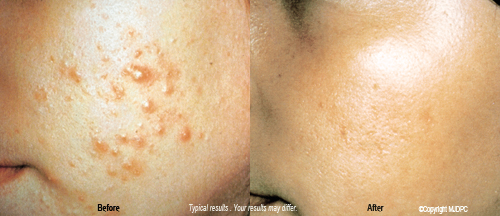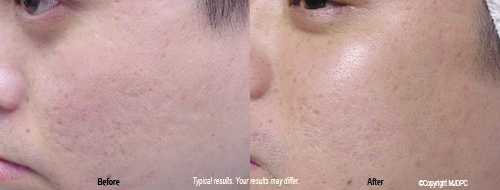What is Acne?The term acne is used to describe a condition which may include comedones (blackheads and whiteheads), red pimples, and even large nodules. The condition affects mainly the face, but may appear also on the shoulders, back, chest, arms, and buttocks. As you probably know, acne is commonly a skin disease of adolescence, but it can affect adults as well. The tendency towards acne often, but not always, runs in families. Treatments which help teens can often help adults as well. Acne is treated by our doctor for patients in our region. 
What causes Acne?The cause starts with the sebaceous glands that connect to hair follicles. These glands of the skin secrete an oily material called sebum, which normally softens and lubricates the skin. The sebaceous glands become most active at puberty, leading to somewhat oily skin. Plugging of the hair follicles with dead skin cells also occurs in acne. When there is no inflammation, this leads to closed comedones (whiteheads) or open comedones (blackheads). The black color is not due to dirt, but rather from chemical changes in the cells. Finally, a bacteria called Propionibacterium acnes thrives off the sebum, overgrows, and attracts your body's immune cells, leading to inflammation and red bumps or nodules. Acne treatments are performed by our doctor for patients in our region to restore their complexion. 
Will the Acne go away?In most patients, acne tends to subside late in the teens to early twenties. Some patients continue to experience acne throughout adulthood. It is impossible to predict when acne will disappear. While the condition is active, it may alternately erupt and then improve. It is up to you and our physician, working together, to help control it. What things make Acne worse?Severe or prolonged stress may aggravate acne. That's why acne may flare up before examinations, weddings, during new jobs, etc. In women, acne may flare shortly before menstruation because of the influence of hormonal factors. Foods like chocolate and soda pop have never been proven to aggravate acne. Still, some patients find that avoiding these and other foods will improve their complexions. If you find that certain foods like chocolate, fatty foods, or excessive amounts of sweets seem to aggravate your condition, it is best to avoid them. In general, the best diet for those with acne is a well-balanced one. What about cosmetics and Acne?Cosmetics containing oil should be avoided as this can lead to plugging of the skin's pores. It is best to avoid heavy greases or gels in the hair especially if you have acne around the hairline. Look for cosmetics that are "oil-free." There are many brands available today. What should I avoid if I have Acne?Rubbing and scrubbing of the face will eventually aggravate acne. Cleansing 2 - 3 times a day is adequate, but washing vigorously may cause more inflammation. Other sources of friction, such as leaning on or rubbing an area of the skin affected with acne, or the pressure from helmets, tight collars or backpacks may also have similarly harmful effects. Squeezing of acne lesions should also be avoided as it may lead to more irritation, inflammation, and prolongation or redness. How do I control my Acne?There are a number of different medications which can help control acne, from mild to severe forms. - Glycolic Acids (Alpha Hydroxy Acids) and Salicylic Acids (Beta Hydroxy Acids): Contained in washes, toners, lotions, and peels, these acids help to unplug pores and regulate the skin cycling process. They may even help to fade the red spots that occur after acne breakouts.
- Antibiotics: These come in pill and topical forms. There are a variety of antibiotics to choose form. The majority of antibiotics used for acne are rarely used for other illnesses. There is little risk in creating "antibiotic resistance" from the use of acne medications. Occasionally though, the bacteria which causes acne will become resistant to the antibiotic, and a different antibiotic can be prescribed. You can safely take antibiotic pills for several months, even years to control your acne under the guidance of your doctor.
- Benzoyl Peroxides: Benzoyl peroxide creams and washes help to fight the bacteria which causes acne. The bacteria cannot become immune to it. Be careful, benzoyl peroxide can bleach your clothing.
- Retinoids (Retin-A, Differin, Tazorac): Retinoids work by opening up plugged pores. They make the skin cells less sticky, so patients may notice mild flaking of the skin when first used. They will take several months to unplug pores, as the skin takes 28 days to cycle.
- Isotretinoin (Accutane): Isotretinoin is the only medication that regulates the oil production in the skin. It also helps to regulate the skin cycling process. Because it turns down the oil production, many patients experience dry skin and lips while on the medication. Taking Accutane requires close monitoring of liver and blood functions, and it cannot be used in pregnancy. It is usually used for patients with severe acne, or acne which fails to respond to antibiotic pills.
- Other Medications: There are many other medications that can help control acne. These include birth control pills (Ortho Tri-cyclen is the only one currently FDA approved for treating acne), Spironolactone pills (which help some women with acne), and topical Azelex cream to name a few. We will work with you to find the right combination of medications to control your acne.
|
Search for doctors who perform this procedure: